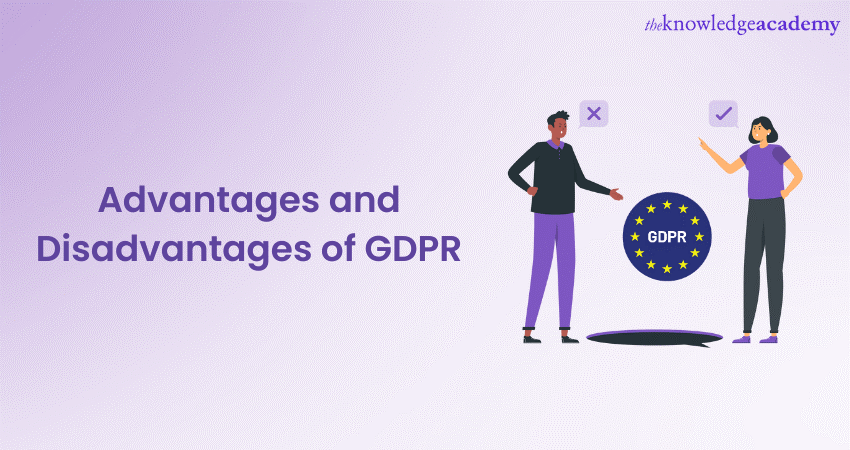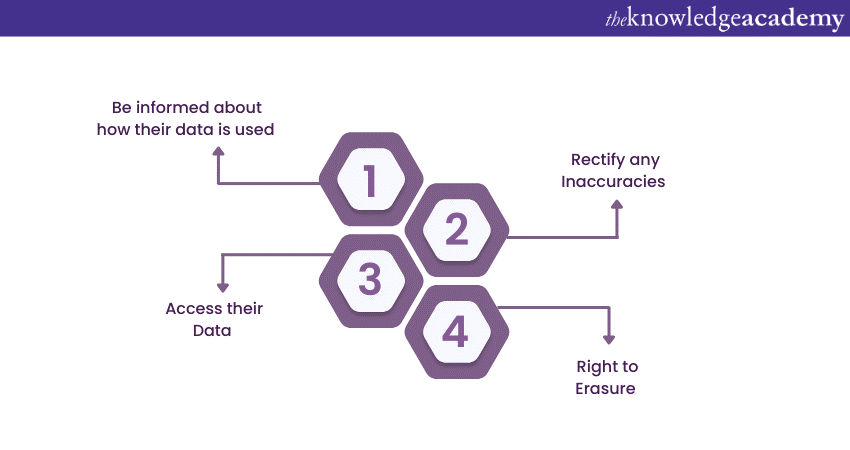We may not have the course you’re looking for. If you enquire or give us a call on 01344203999 and speak to our training experts, we may still be able to help with your training requirements.
Training Outcomes Within Your Budget!
We ensure quality, budget-alignment, and timely delivery by our expert instructors.

In the current digital age, protecting personal data and privacy has become a critical concern for individuals, businesses, and governments worldwide. This is where the General Data Protection Regulation (GDPR) proves to be a boon. However, there are many Advantages and Disadvantages of GDPR to consider as well.
After introducing this comprehensive legal framework, many organisations worldwide have become GDPR compliant. According to Legal Jobs, it is estimated that £7 billion has been spent on its compliance. But at the same time, many organisations in different regions of the world want their local governments to adopt personal data privacy laws like the GDPR.
So, before adopting this legal framework in your organisation, get familiar with why is gdpr important and its Advantages and Disadvantages. Read this blog to know the Advantages and Disadvantages of GDPR in detail to enhance your data protection practices, business operations, and individual rights.
Table of Contents
1) What are the pros of GDPR?
a) Enhanced data protection
b) Empowering data subjects
c) Global data standardisation
d) Improved security measures
e) Increased accountability
f) Competitive advantage for compliant organisations
2) Cons of GDPR
a) Compliance costs
b) Operational complexity
c) Impact on small businesses
d) Inconsistent implementation across EU Member States
e) Extraterritorial reach and global compliance challenges
3) Conclusion
What are the pros of GDPR?
The legal framework brings several key advantages to individuals and organisations alike. Let’s explore the Advantages of GDPR:
Enhanced data protection
The legal framework significantly strengthens privacy by establishing strict guidelines for organisations to collect, store, and process personal data. This ensures that individuals’ information is handled securely and responsibly, reducing the risk of data breaches and unauthorised access. By enforcing robust data protection practices, GDPR helps to build trust between individuals and organisations.
Take the first step towards GDPR compliance. Register for our GDPR Training now!
Empowering data subjects
One of the fundamental GDPR principles is educating individuals about their personal data. It introduces several rights for data subjects, granting them greater control over their information. Individuals have the right to:

This allows them to request the removal of their data under certain circumstances. These rights empower individuals to make informed decisions and have more control over their personal information.
Global data standardisation
The framework also establishes a unified set of regulations for data protection across the European Union (EU). This harmonisation simplifies compliance for organisations operating within the EU.
Further, they can follow a single set of rules instead of navigating different regulations in each member state. Additionally, it also promotes consistency in data protection practices, ensuring a high level of privacy and security for individuals across borders.
Improved security measures
Another benefits of GDPR is that it encourages organisations to implement robust security measures to protect personal data. This includes measures such as encryption, pseudonymisation, and regular security assessments.
As a result, organisations can reduce the risk of data breaches and unauthorised access. Additionally, to know what is a gdpr breach they are incentivised to invest in cybersecurity measures, enhancing the overall protection of individuals’ personal information.
Increased accountability
Under this legal framework, organisations are required to demonstrate accountability in their data processing activities. They must maintain detailed records of their data processing activities, including the legal basis for processing, data retention periods, and security measures implemented. This accountability fosters transparency and ensures that organisations take responsibility for their data-handling practices.
Competitive advantage for compliant organisations
Demonstrating GDPR compliance signals to customers and partners that an organisation prioritises data protection and privacy. It enhances its reputation and can attract customers who value their privacy rights.
Additionally, compliance with GDPR can facilitate data transfers and partnerships with other GDPR-compliant entities, expanding business opportunities.
Cons of GDPR
Although it significantly improves data protection and privacy, there are certain Challenges of GDPR. Let’s explore the drawbacks associated with this framework:
Compliance costs
One of the main concerns for organisations is the cost of GDPR compliance. Implementing the essential measures to ensure data protection and privacy can be financially burdensome, especially for Small and Medium-sized Enterprises (SMEs).
It may require investments in technology, staff training, and legal support. Therefore, these costs can be particularly challenging for smaller businesses with limited resources.
Develop a deep understanding of GDPR principles with our Certified Data Protection Officer (CDPO) Course.
Operational complexity
Compliance with this framework means organisations require the following:
a) Navigating intricate legal frameworks
b) Understanding data protection impact assessments
c) Implementing appropriate technical and organisational measures
This complexity can be overwhelming, especially for organisations with limited legal expertise or IT infrastructure. Thus, meeting these requirements may challenge some businesses as it requires significant operational changes and adjustments.
Impact on small businesses
Small businesses may find it particularly challenging to comply with the extensive requirements. This is because they often lack the resources and expertise of larger enterprises.
Additionally, the administrative burden of GDPR can place strain on these businesses, potentially diverting their focus and resources away from core operations.
Inconsistent implementation across EU Member States
Although GDPR aims to harmonise data protection laws across EU Member States, there may be inconsistencies in its implementation and interpretation. Each member state has some flexibility in adopting and enforcing certain provisions.
This can lead to potential variations in practices and regulations. Further, it can create compliance challenges for organisations operating across multiple EU jurisdictions.

Extraterritorial reach and global compliance challenges
The framework’s extraterritorial reach means that organisations outside the EU may be subject to its regulations if they handle the personal data of EU residents. This can pose challenges for international businesses to navigate multiple data protection regimes.
Therefore, achieving global compliance with GDPR and other international data protection laws can be complex and resource-intensive, especially for organisations operating in various jurisdictions with differing GDPR Requirements.
Conclusion
The General Data Protection Regulation represents a significant milestone in data protection and privacy. However, there are several Advantages and Disadvantages of GDPR that helps shape the landscape of personal data handling and privacy rights. Therefore, it is essential to recognise its underlying goals of protecting personal data and privacy rights before getting compliant.
Demonstrate your commitment to privacy with our Certified EU General Data Protection Regulation (EU GDPR) Foundation And Practitioner Course.
Frequently Asked Questions
Upcoming IT Security & Data Protection Resources Batches & Dates
Date
 Certified EU General Data Protection Regulation (EU GDPR) Foundation and Practitioner
Certified EU General Data Protection Regulation (EU GDPR) Foundation and Practitioner
Sat 25th May 2024, Sun 26th May 2024
Mon 8th Jul 2024
Sat 14th Sep 2024, Sun 15th Sep 2024
Mon 23rd Sep 2024
Mon 18th Nov 2024
Sat 7th Dec 2024, Sun 8th Dec 2024
Mon 13th Jan 2025
Mon 3rd Mar 2025
Mon 14th Apr 2025
Tue 27th May 2025
Mon 14th Jul 2025
Tue 26th Aug 2025







 Top Rated Course
Top Rated Course


 If you wish to make any changes to your course, please
If you wish to make any changes to your course, please


